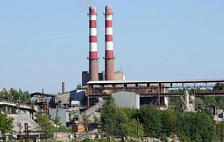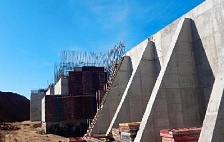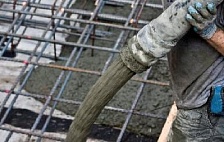15.11.2019 18:55
Ukrcement Accuses State-Owned Ukrainian Railways of Restraining the Cement Industry Growth
Cement production in Ukraine decreased by 1.5% over the first nine months of the year, announced the head of the association of cement producers Ukrcement Roman Skilsky. Skilsky made the announcement during a panel discussion of the reorganization of Ukrainian railways, claiming the work of the state-owned monopolist Ukrainian Railways as the primary reason behind the decline.
Cement plants currently operate at the capacity of 70%, but enterprises are forced to limit the production even more, since the inefficient logistics of the railway monopolist makes delivering cement on time and in full impossible. According to Ukrcement, up to 20% of railcars loaded with cement are idling at intermediate depots.
“For our companies, it all means punitive measures and even contract failure. It also means additional expenses, if the rolling stock is rented,” says Roman Skilsky.
On the other hand, clinker production increased by 9% over the year.
“It means that enterprises prefer to keep the clinker they produce, since you can store it longer and selling cement is not a viable option, since the delivery to customers is unreliable. Thus, the production lags behind the demand, creating an artificial shortage of cement on the market,” said the head of Ukrcement.
At the same time, the construction and building materials markets experience a dynamic growth: 24% and 16% over 2018 respectively. According to statistics, 12 million tons of concrete were produced from January to September this year, making it a record of the last decade.
“Due to logistics problems, our enterprises lost about 2% in growth last year. Next year this figure will reach 6%,” said Roman Skilsky. With the increase in railway tariffs the cost of transportation of cement shot up by up to 64%. Moreover, Ukrainian Railways suggests a new indexation.
Skilsky also notes that the transportation cost of such vital production component as slag, is going to go up by 80%. All despite the fact that today it is already more expensive than the cargo itself. The head of Ukrcement suggests that the only way to reduce tariffs and solve other problems is to reorganize the state-owned Ukrainian Railways.
According to Ukrstat [State Statistics Service of Ukraine], since Q2 2019 cement production in the country is declining. In comparison to 2018 it has already plummeted by 14.6%. The country produced 6.8 million tons of cement by the end of the high construction season in 2019 (January-September), which is 5.6% lower than 2017 season.
Cement plants currently operate at the capacity of 70%, but enterprises are forced to limit the production even more, since the inefficient logistics of the railway monopolist makes delivering cement on time and in full impossible. According to Ukrcement, up to 20% of railcars loaded with cement are idling at intermediate depots.
“For our companies, it all means punitive measures and even contract failure. It also means additional expenses, if the rolling stock is rented,” says Roman Skilsky.
On the other hand, clinker production increased by 9% over the year.
“It means that enterprises prefer to keep the clinker they produce, since you can store it longer and selling cement is not a viable option, since the delivery to customers is unreliable. Thus, the production lags behind the demand, creating an artificial shortage of cement on the market,” said the head of Ukrcement.
At the same time, the construction and building materials markets experience a dynamic growth: 24% and 16% over 2018 respectively. According to statistics, 12 million tons of concrete were produced from January to September this year, making it a record of the last decade.
“Due to logistics problems, our enterprises lost about 2% in growth last year. Next year this figure will reach 6%,” said Roman Skilsky. With the increase in railway tariffs the cost of transportation of cement shot up by up to 64%. Moreover, Ukrainian Railways suggests a new indexation.
Skilsky also notes that the transportation cost of such vital production component as slag, is going to go up by 80%. All despite the fact that today it is already more expensive than the cargo itself. The head of Ukrcement suggests that the only way to reduce tariffs and solve other problems is to reorganize the state-owned Ukrainian Railways.
According to Ukrstat [State Statistics Service of Ukraine], since Q2 2019 cement production in the country is declining. In comparison to 2018 it has already plummeted by 14.6%. The country produced 6.8 million tons of cement by the end of the high construction season in 2019 (January-September), which is 5.6% lower than 2017 season.
The use of materials published on the site is allowed only with the reference to the source (the journal «Cement and its application») and a hyperlink to the quoted material.
Share:





